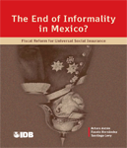The End of Informality in Mexico?: Fiscal Reform for Universal Social Insurance
Date
Mar 2013
Mexico is characterized by a dual social insurance architecture. Firms and workers in salaried contractual relations are obligated to pay for a bundled set of health, pension and related programs. Nonsalaried workers benefit from an unbundled set of parallel programs paid by the government. We develop a model to study the implications of this architecture in a context of informality and imperfect tax enforcement. We argue that this architecture: (i) provides workers with erratic and incomplete coverage against risks, (ii) fosters evasion and narrows the tax base, (iii) delinks contributions from benefits undermining fiscal sustainability, and (iv) distorts the labor market lowering real wages and total factor productivity.




